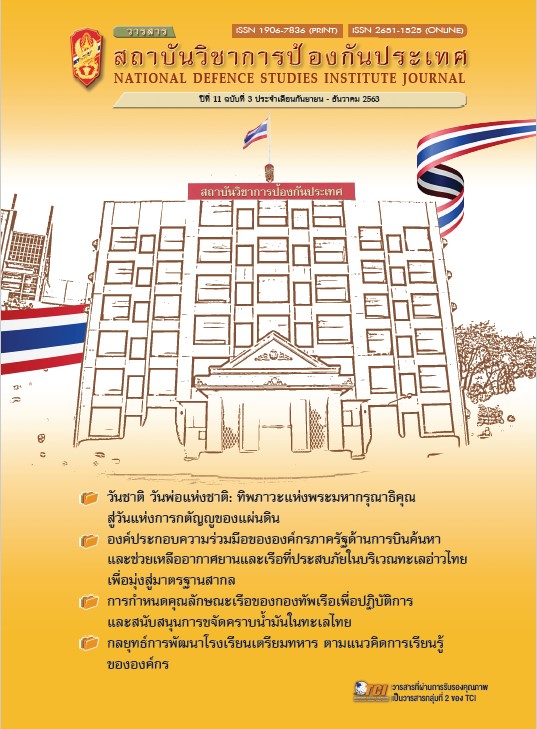The Study on the Relationship of Motivation and Knowledge Transfer of the Pre-Retirement Employees: Case Studies of Somboon Group
Main Article Content
Abstract
The objective of this research is to study 1) the opinions on the motivation factors of the pre-retirement employees, 2) the opinions on the knowledge transfer of the pre-retirement employees, and 3) the relationship between the employee motivation factors and the employee knowledge transfer. Questionnaires are used as a research instrument for collecting data consisting of the employee general data, motivation factors, and knowledge transfer, with Index of Content Validity at 0.993. The research sample consists of 102 pre-retirement employees of Somboon Advance Technology Public Company Limited with five remaining years until retirement. The statistics applied in data analysis are descriptive statistics consisting of Frequency, Percentage, Average, and Standard Deviation; and inferential statistics consisting of One-way ANOVA, F-test, and Pearson Correlation Coefficient.
The findings of the research indicate that 83.33% of the respondents are male, 51.96% have the educational level of below Bachelor’s Degree, 41.18% work in the positions of officer and staff, 39.22% have been working for 11-20 years and 38.24% are to be retired in 2024. The pre-retirement employees of the companies in Somboon Group with different position levels have different knowledge transfer while those with different sexes, educational levels, service durations, and retirement years, there is no significant difference in knowledge transfer. The motivation factors are related to knowledge transfer, relationship with colleagues, working environment, working success, acceptance, job description, and payment at a significant level of 0.05. The relationship with colleagues is the most highly related to knowledge transfer in a form of mentoring system.
Article Details
The articles, images, tables, graphs, written content, and opinions published in this journal are solely those of the authors and do not necessarily reflect the views or positions of the National Defence Studies Institute or its academic affiliates.
References
กมลพร กัลยาณมิตร. (2559). แรงจูงใจ 2 ปัจจัย พลังสู่ความสำเร็จ. มหาวิทยาลัยกรุงเทพธนบุรี.
ใจชนก ภาคอัต. (2557). การจัดการความรู้ด้านการประกันคุณภาพการศึกษาของสถาบันบัณฑิตพัฒนบริหารศาสตร์.สถาบันบัณฑิตพัฒนบริหารศาสตร์.
ณัฐวัตร เป็งวันปลูก. (2560). ปัจจัยจูงใจที่ส่งผลต่อประสิทธิภาพในการทำงาน ของข้าราชการทหารประจำสังกัดกองพันทหารราบที่ 1 กรมทหารราบที่ 7 (สาขาวิชาการบริหารธุรกิจ). มหาวิทยาลัยราชภัฏเชียงใหม่.
บุญดี บุญญากิจ และคณะ. (2549). การจัดการความรู้ จากทฤษฎีสู่การปฏิบัติ (พิมพ์ ครั้ง ที่ 3). กรงุ เทพฯ: สถาบันเพิ่มผลผลิตแห่งชาติ.
ปฐมวงค์ สีหาเสนา. (2557). แรงจูงใจในการปฏิบัติงานของบุคลากรเทศบาลตำบลค่ายเนินวง ตำบลบางกะจะอำเภอเมืองจันทบุรี จังหวัดจันทบุรี (รัฐประศาสนศาสตรมหาบัณฑิต สาขาวิชาการจัดการภาครัฐและภาคเอกชน).มหาวิทยาลัยบูรพา.
มนัส ชูผกา. (2558). การพัฒนารูปแบบการถ่ายทอดความรู้ในอุตสาหกรรมโรงสีข้าว (วิทยานิพนธ์ปริญญาดุษฎีบัณฑิตสาขาวิชาพัฒนาธุรกิจอุตสาหกรรมและทรัพยากรมนุษย์). มหาวิทยาลัยเทคโนโลยีพระจอมเกล้าพระนครเหนือ.
วีรยุทธ วาณิชกมลนันทน์. (2559). ปัจจัยที่ส่งผลต่อแรงจูงใจในการปฏิบัติงานของพนักงาน บริษัทสยามกลาสอินดัสทรี จำกัดโรงงานอยุธยา. (บริหารธุรกิจมหาบัณฑิต สาขาวิชาการจัดการเชิงกลยุทธ์). มหาวิทยาลัยธรรมศาสตร์.
วัลลภัช สุขสวัสดิ์. (2560). การวิจัยเชิงปริมาณทางรัฐศาสตร์ (พิมพ์ครั้งที่ 1). พิษณุโลก: สำนักพิมพ์มหาวิทยาลัยนเรศวร.
สุรีโย กัณหา. (2558). การจัดการความรู้เพื่อการพัฒนาผลิตภัณฑ:์ กรณีศึกษาโรงงานผู้ผลิตเครือ่ งจกั รอตุ สาหกรรมอาหาร.(วิศวกรรมศาสตรมหาบัณฑิต สาขาวิชาการพัฒนางานอุตสาหกรรม). มหาวิทยาลัยธรรมศาสตร์.
อภิญญา ขอพรกลาง, แววตา เตชาทวีวรรณ, และจุฑารัตน์ ศราวณะวงศ์. (2561). ปัจจัยที่มีความสัมพันธ์กับกระบวนการจัดการความรู้ของสถาบันทันตกรรม กรมการแพทย์ กระทรวงสาธารณสุข. มหาวิทยาลัยศรีนครินทรวิโรฒ.
เอกชัย คนคิด และชลภัสส์ วงษ์ประเสริฐ. (2559). ปัจจัยที่เอื้อต่อการแลกเปลี่ยนเรียนรู้และการถ่ายโอนความรู้ของบุคลากรบ้านพักเด็กและครอบครัว (วิทยานิพนธ์ศิลปศาสตรมหาบัณฑิต สาขาวิชาการจัดการสารสนเทศ). มหาวิทยาลัยขอนแก่น.
อำนาจ มาวุฒิ. (2560). ปัจจัยที่ส่งผลต่อความสำเร็จในการถ่ายโอนความรู้สู่สังคมของคณะแพทยศาสตร์ มหาวิทยาลัย
เชียงใหม่ (รัฐประศาสนศาสตรมหาบัณฑิต). มหาวิทยาลัยเชียงใหม่.


